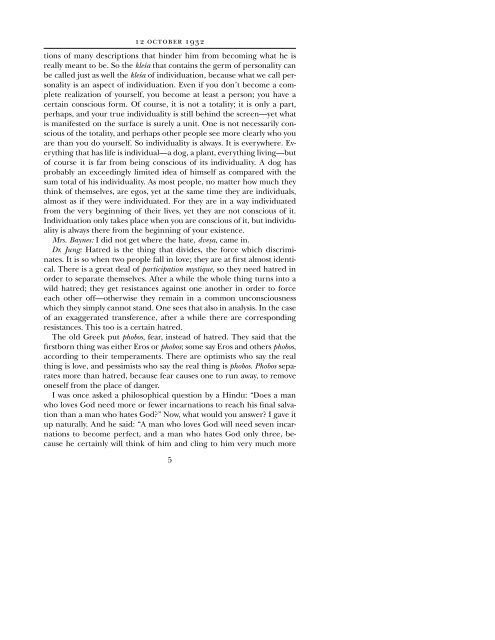CG JUNG - Countryside Anarchist
CG JUNG - Countryside Anarchist
CG JUNG - Countryside Anarchist
Create successful ePaper yourself
Turn your PDF publications into a flip-book with our unique Google optimized e-Paper software.
12 OCTOBER 1932<br />
tions of many descriptions that hinder him from becoming what he is<br />
really meant to be. So the kleça that contains the germ of personality can<br />
be called just as well the kleça of individuation, because what we call personality<br />
is an aspect of individuation. Even if you don’t become a complete<br />
realization of yourself, you become at least a person; you have a<br />
certain conscious form. Of course, it is not a totality; it is only a part,<br />
perhaps, and your true individuality is still behind the screen—yet what<br />
is manifested on the surface is surely a unit. One is not necessarily conscious<br />
of the totality, and perhaps other people see more clearly who you<br />
are than you do yourself. So individuality is always. It is everywhere. Everything<br />
that has life is individual—a dog, a plant, everything living—but<br />
of course it is far from being conscious of its individuality. A dog has<br />
probably an exceedingly limited idea of himself as compared with the<br />
sum total of his individuality. As most people, no matter how much they<br />
think of themselves, are egos, yet at the same time they are individuals,<br />
almost as if they were individuated. For they are in a way individuated<br />
from the very beginning of their lives, yet they are not conscious of it.<br />
Individuation only takes place when you are conscious of it, but individuality<br />
is always there from the beginning of your existence.<br />
Mrs. Baynes: I did not get where the hate, dveüa, came in.<br />
Dr. Jung: Hatred is the thing that divides, the force which discriminates.<br />
It is so when two people fall in love; they are at first almost identical.<br />
There is a great deal of participation mystique, so they need hatred in<br />
order to separate themselves. After a while the whole thing turns into a<br />
wild hatred; they get resistances against one another in order to force<br />
each other off—otherwise they remain in a common unconsciousness<br />
which they simply cannot stand. One sees that also in analysis. In the case<br />
of an exaggerated transference, after a while there are corresponding<br />
resistances. This too is a certain hatred.<br />
The old Greek put phobos, fear, instead of hatred. They said that the<br />
firstborn thing was either Eros or phobos; some say Eros and others phobos,<br />
according to their temperaments. There are optimists who say the real<br />
thing is love, and pessimists who say the real thing is phobos. Phobos separates<br />
more than hatred, because fear causes one to run away, to remove<br />
oneself from the place of danger.<br />
I was once asked a philosophical question by a Hindu: “Does a man<br />
who loves God need more or fewer incarnations to reach his final salvation<br />
than a man who hates God?” Now, what would you answer? I gave it<br />
up naturally. And he said: “A man who loves God will need seven incarnations<br />
to become perfect, and a man who hates God only three, because<br />
he certainly will think of him and cling to him very much more<br />
5


